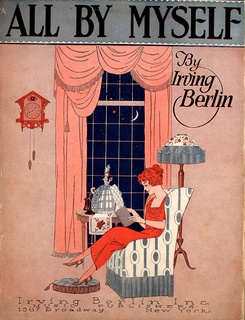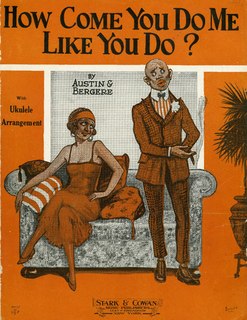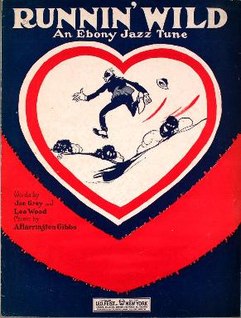Related Research Articles
Shine is a popular song with lyrics by Cecil Mack and Tin Pan Alley songwriter Lew Brown and music by Ford Dabney. It was published in 1910 by the Gotham-Attucks Music Publishing Company and used by Aida Overton Walker in His Honor the Barber, an African-American road show. According to Perry Bradford, himself a songster and publisher, the song was written about an actual man named Shine who was with George Walker when they were badly beaten during the New York City race riot of 1900.

"My Buddy" is a popular song with music written by Walter Donaldson, and lyrics by Gus Kahn. The song was published in 1922 and early popular versions were by Henry Burr (1922), Ernest Hare (1923) and Ben Bernie.
"The One I Love " is a popular song composed by Isham Jones with lyrics by Gus Kahn. The song was recorded by Isham Jones' Orchestra on December 21, 1923, at Brunswick Studios in New York City, and published on January 7, 1924. On January 17 in Chicago, Jones recorded another version, with Al Jolson on lead vocals. Both versions made the charts that Spring, with Jolson's peaking at number 2, and Jones' at number 5. Sophie Tucker recorded her version February 1924, released on Okeh 40054.
"Somebody Loves Me" is a popular song, with music written by George Gershwin, and lyrics by Ballard MacDonald and Buddy DeSylva. The song was published in 1924 and featured in George White's Scandals of 1924.

"Rock-a-Bye Your Baby with a Dixie Melody" is a popular song written by Jean Schwartz, with lyrics by Sam M. Lewis and Joe Young. The song was introduced by Al Jolson in the Broadway musical Sinbad and published in 1918.
"When You're Smiling" is a popular song written by Larry Shay, Mark Fisher and Joe Goodwin in 1928. It bears resemblance to the Spanish Canción "Amapola" by José María Lacalle García. Early popular recordings were by Seger Ellis (1928), Louis Armstrong (1929), and Ted Wallace & His Campus Boys (1930).

"Nobody's Sweetheart", also known as "Nobody's Sweetheart Now" and "You're Nobody's Sweetheart Now", is a popular song, written in 1924, with music by Billy Meyers and Elmer Schoebel, and lyrics by Gus Kahn and Ernie Erdman. The song is a jazz and pop standard.
"The Lady's in Love with You" is a popular song which was written by Burton Lane (music) and by Frank Loesser (lyrics). The song was published in 1939 and introduced in the film "Some Like It Hot" (1939) when it was sung by Bob Hope and Shirley Ross. Ms Ross also sang it in the film with Gene Krupa and His Band. The song was sung by Tony Bennett at his final concerts, at Radio City Music Hall, in 2021.
"I've Found a New Baby", also known as "I Found a New Baby", is a popular song written by Jack Palmer and Spencer Williams. It was introduced by Clarence Williams' Blue Five in 1926 and has since been recorded by many artists, making it a popular jazz standard. Popular versions in 1926 were by Ted Lewis and by Ethel Waters.
"I Let a Song Go Out of My Heart" is a 1938 composition by Duke Ellington, with lyrics added by Irving Mills, Henry Nemo and John Redmond. The song became a number one hit for Ellington in 1938. Other hit versions the same year were by Benny Goodman, Connee Boswell, Hot Lips Page, and Mildred Bailey. It was performed as part of The Cotton Club Parade of 1938.
"Mean to Me" is a popular song with music by Fred E. Ahlert and lyrics by Roy Turk, published in 1929. Hit versions that year were by Ruth Etting and by Helen Morgan. Ben Bernie and the Hotel Roosevelt Orchestra also recorded what might be the first male version in February 1929 with vocals by Scrappy Albert.

"All by Myself" is a popular song written by Irving Berlin, published in 1921.

"Way Down Yonder in New Orleans" is a popular song with music by John Turner Layton Jr. and lyrics by Henry Creamer. First published in 1922, it was advertised by Creamer and Layton as "A Southern Song, without A Mammy, A Mule, Or A Moon", a dig at some of the Tin Pan Alley clichés of the era.
"Flamingo" (1940) is a popular song and jazz standard written by Ted Grouya with lyrics by Edmund Anderson and first recorded by singer Herb Jeffries and the Duke Ellington Orchestra on December 28, 1940, for Victor Records. This briefly reached the Billboard charts in 1941.

"How Come You Do Me Like You Do?" is a song written by vaudeville comedy duo Gene Austin and Roy Bergere in 1924. It has later been covered by many artists, and is considered a jazz standard.
"For Me and My Gal" is a 1917 popular standard song by George W. Meyer with lyrics by Edgar Leslie and E. Ray Goetz. Popular recordings of the song in 1917 were by Van and Schenck; Prince's Orchestra; Henry Burr and Albert Campbell; and by Billy Murray.

"Runnin' Wild" is a popular song first composed and recorded in 1922, written by Arthur Harrington Gibbs with lyrics by Joe Grey and Leo Wood.
"Between the Devil and the Deep Blue Sea" is an American popular song published in 1931, with music by Harold Arlen and lyrics by Ted Koehler, and first recorded by Cab Calloway in 1931. It was introduced in the 1931 Cotton Club show Rhythmania and is now a widely recorded standard.
"Sweet Sue, Just You" is an American popular song of 1928, composed by Victor Young with lyrics by Will J. Harris. Popular versions in 1928 were by Earl Burtnett and by Ben Pollack.
"The Moon of Manakoora" is a popular song written by Frank Loesser (lyrics) and Alfred Newman (music) for the 1937 Paramount film The Hurricane starring Dorothy Lamour. Lamour sang the song in the film and also made a commercial recording of it. The song "The Moon of Manakoora" is considered a standard and was Loesser's first success as a lyric writer.
References
- ↑ "Internet Broadway Database". ibdb.com. Retrieved June 12, 2017.
- ↑ CD liner notes: Chart-Toppers of the Twenties, 1998 ASV Ltd.
- ↑ Whitburn, Joel (1986). Joel Whitburn's Pop Memories 1890-1954. Wisconsin, USA: Record Research Inc. p. 274. ISBN 0-89820-083-0.
- ↑ "Archive.org: Benny Goodman Carnegie Hall Jazz Concert" . Retrieved 2019-06-10.
- ↑ "Archive.org: Benny Goodman At Carnegie Hall 1938 Columbia Records SL 160" . Retrieved 2019-06-10.
- ↑ "Internet Movie Database". imdb.com. Retrieved June 12, 2017.
- ↑ "Internet Movie Database". imdb.com. Retrieved June 12, 2017.
- ↑ Whitburn, Joel (1986). Joel Whitburn's Pop Memories 1890-1954. Wisconsin, USA: Record Research Inc. p. 607. ISBN 0-89820-083-0.
- ↑ "Discography of American Historical Recordings (DAHR)" . Retrieved 2019-06-10.
- ↑ "Archive.org: Sunny Clapp & His Band O' Sunshine 78rpm Collection" . Retrieved 2019-06-10.
- ↑ "Discogs.com". Discogs.com. Retrieved June 12, 2017.
- ↑ "Discogs.com". Discogs.com. Retrieved June 12, 2017.
- ↑ "allmusic.com". allmusic.com. Retrieved June 12, 2017.